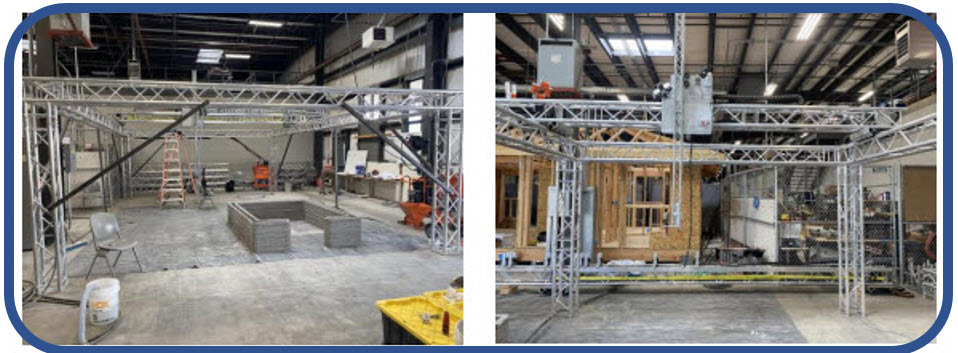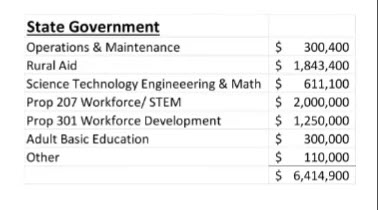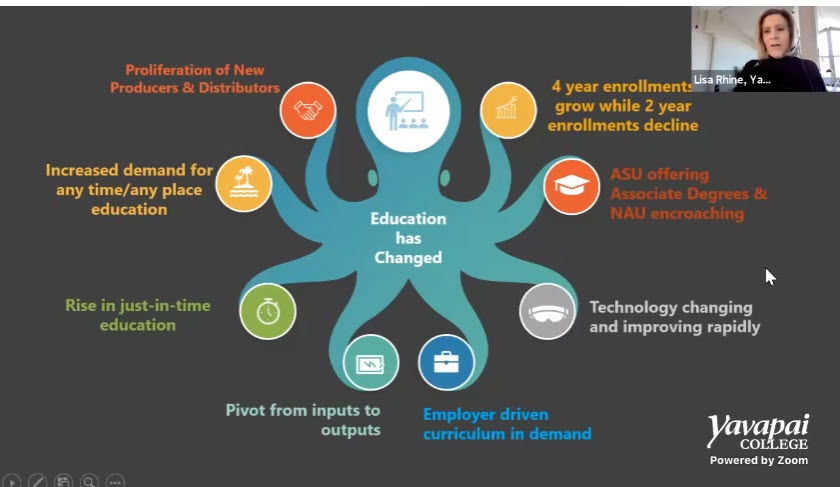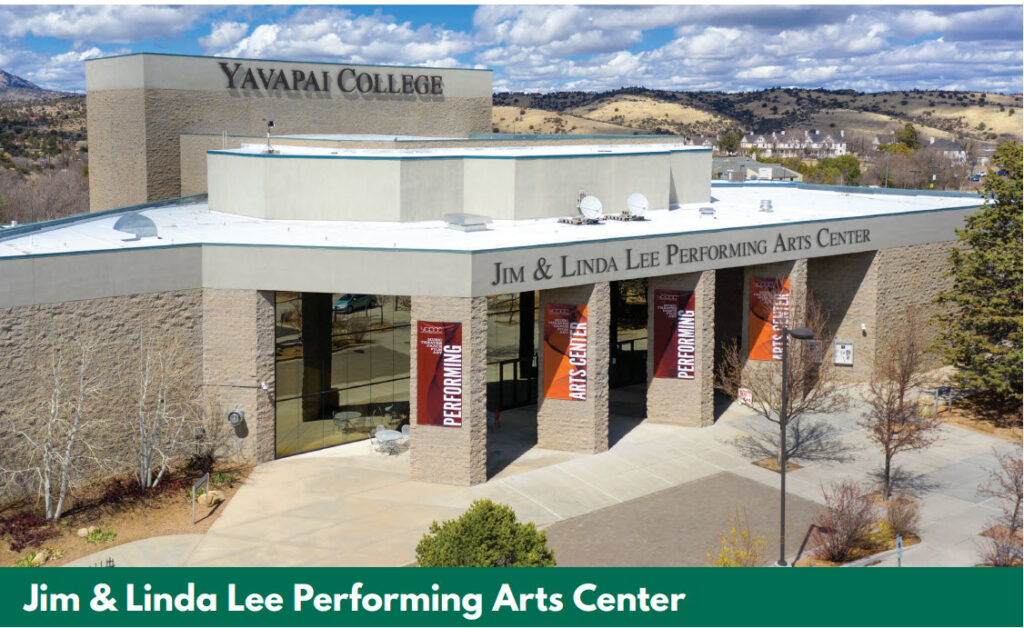Author Archive for R. Oliphant – Page 34
YAVAPAI COMMUNITY COLLEGE CLOSED UNTIL MARCH 20, 2023 FOR SPRING BREAK
YAVAPAI COUNTY SCHOOL SUPERINTENDENT TIM CARTER ANNOUNCES APPOINTMENT OF MR. ALTON “TOBY” PAYNE TO THE YAVAPAI COLLEGE GOVERNING BOARD TO REPRESENT DISTRICT 3 (SEDONA AND THE UPPER VERDE VALLEY)
Mr. Payne is a second-generation Arizona native, raised in Phoenix, who spent twenty-five years in Cave Creek/Carefree, and now lives permanently in Clarkdale
Yavapai County School Superintendent Tim Carter announced March 10, 2023, the appointment of Mr. Alton “Toby” Payne to the Yavapai College Governing Board to represent District 3 (Sedona and the upper Verde Valley). Mr. Payne is a second-generation Arizona native, raised in Phoenix, who spent twenty-five years in Cave Creek/Carefree, and now lives permanently in Clarkdale.
The following is a portion of the press release regarding the appointment as released by Mr. Carter’s office:
Yavapai County School Superintendent Tim Carter is pleased to announce the appointment of Mr. Alton “Toby” Payne to the Yavapai College Governing Board to represent District 3 (Sedona and the upper Verde Valley).
Mr. Payne is a second-generation Arizona native, raised in Phoenix, who spent twenty-five years in Cave Creek/Carefree, and now lives permanently in Clarkdale. He spent thirty years as an entrepreneur in the audio-visual industry, as the founder of State Sound of Arizona. He has toured with Andy Williams, Sammy Davis Jr., Waylon Jennings, and designed and supplied the sound systems for the Papal Visit to Arizona State University. He also taught for ten years at the International Communications Industries Association Institute for Professional Development.
Mr. Payne has served on the Governing Board of the Cave Creek Unified School District, serving as President of the Board twice. The district spanned 144 square miles and included several municipalities including portions of Scottsdale, Phoenix, Carefree and Cave Creek. His service was at a time of rapid growth for the area when school construction was needed.
He has been working with various non-profits and community groups for many years, including Arizona Town Hall, Kiwanis, site survey for the Mabery Pavilion on the Clarkdale campus of Yavapai College, Growth Committee of the Clarkdale-Jerome School District, and the Verde Valley Amateur Radio Association.
Mr. Carter received a letter of resignation from Yavapai College Governing Board Member Paul Chevalier, effective January 30, 2023. Dr. Chevalier said, “today I turned 84 and, while my health is good, this is the moment for me to step down and let someone younger take my position.” Mr. Carter thanked Dr. Chevalier for his service to the residents of District 3. Mr. Carter posted the vacancy for this non-partisan seat for the remaining two years of the existing term. Prior to the deadline for receipt of letters of interest and the supporting information, Mr. Carter received the required materials from five qualified candidates.
Superintendent Carter makes use of a Candidate Review Committee in making community college appointments. This is a process which engages a cross section of community members from District 3 in the process.
He would like to express appreciation to the committee for their volunteer services to the community. County Supervisor Donna Michaels (Sedona) served as the elected official as she represents the same geographical area and residents within Yavapai County, Mrs. Barbara U’Ren (unincorporated areas) represented taxpayers, Chell Smart (Clarkdale) represented students, Kimberly Gould (Cottonwood) represented the college faculty, and Ruth Ellen Elinski (Cottonwood) represented economic development entities.
The committee reviewed the materials, prepared interview questions, decided who to interview and participated and evaluated the interviews. The committee also provides Mr. Carter with insight about their collective perception of each candidate, and they made very valuable recommendations for his consideration. The Superintendent and committee interviewed three finalists on Monday, March 6th in Sedona.
Mr. Carter hosted an opportunity for the public to meet with him personally in face-to-face meetings on March 9th in Sedona. He provided his email address and cell phone number for those individuals wishing to use one of those options. He spoke individually with many of the current Yavapai College Governing Board Members and college administration in person or on the phone prior to making the appointment. Forty-four (44) residents communicated with the Superintendent in one manner or another about their preferences. He appreciated and respected the responses.
Mr. Payne will be sworn in at a public event at Yavapai College, Sedona Campus at 1:00 pm on Tuesday, March 21, 2023. His term will end December 31, 2024. He has indicated an intent to run for the seat in the 2024 election cycle for a six-year term starting January 2025. He may be reached at 480.544.2290. Mr. Carter may be reached at 928.925.6560.
AFTER PURCHASING HALF MILLION DOLLAR 3D CONCRETE PRINTERS IN 2020, COLLEGE UNEXPECTEDLY FOUND ITSELF FACING HUGE RESEARCH PROJECT CONSUMING VAST AMOUNTS OF CTEC FACULTY TIME AND NEED TO BUILD AND REPLACE PURCHASED PRINTERS WITH BETTER ONES
After three years, building two additional printers, incurring continual major highly technical and practical issues, College still hasn’t met goal of building one small facility with its four machines
Yavapai Community College’s CTEC faculty has faced apparently unforeseeable and massive technical and practical challenges after the College and its Governing Board was convinced by someone to purchase two 3D cement printers three years ago, January 2020. The price tag on the two 3D printers was a half million dollars.
Enormous amounts of CTEC faculty time and energy plus expenditures of an unannounced amount of revenue have been spent on trying to turn the project around and solve technical and practical problems — in addition to building two new printers while sidelining the original purchases.
These revelations were shared by CTEC Dean John Morgan during the District Governing Board meeting held February 21, 2023. Morgan explained to the Board that after realizing the first two machines it purchased were not suitable for the College’s intended use, it proceeded to construct two more machines that it felt would meet its purpose. And began the long road to solve the technical issues associated with using them.
According to Morgan, after the 2020 purchase, the Community College faced a variety of challenges including a need to build its own machines, a cement mix shortage and many extraordinarily difficult technical issues.
One can get gain a glimpse into the time and effort dedicated to the project when the Community College recently recognized Matt Mintzmeyer, Director of Aerospace Science/3D Printing and Manufacturing, for his tireless work on its behalf.
The College in recognizing Mintzmeyer said, in part:
He has spent 100’s of hours outside of the workday getting the machines to function properly, while also battling COVID. Without this commitment, we would not be able to move forward with 3D house printing due to the complexity of the operation.
Director Mintzmeyer has been successful at putting together a good team to keep going with the ongoing learning curve involved in 3D house printing. His easy going and “can do” attitude have been very noticeable. He has communicated well with the 3D team, and has them coming in to run test prints on a regular basis. As we inch closer to building a house, those skills will continue to be needed, and he will have to keep that team motivated in his role as Director.
Matt has spent many a late night working on improvements to the 3D printing lab at CTEC, as well as mastering the 3D house printing machine as part of the construction program. He has reached out to industry concerning directions we need to go in 3D printing, and has gleaned some good ideas that he has helped incorporate into the classroom. At a time when frustrations have been high, Matt has continued to work through problems pertaining to 3D house printing.
It can be noted that the College has refused a request from the Blog to provide estimates of the cost of building the two new machines or the amount of any grants that were used to construct any of the additional equipment or pay for all the unanticipated staff time needed to try and save the project.
Below is a copy of the decision by the Governing Board made at a hurriedly called Executive session to alter the 2019-2020 budget so the half million could be spent on the two 3D printers. The College still has them but they have been sidelined in favor of the two the College built on its own.

Here is a photo shown to the Governing Board of the original two 3D printers purchased for a half million. Dean Morgan said the manufacturer stood by its warranties on the machines. Although able to function, they are apparently serving no purpose at the present time.

Here is a photo of the two 3D printers that the College built at its own cost after it concluded the two it had purchased were not adequate to perform the tasks it thought they could.

STATE OF ARIZONA INCREASES ANNUAL FINANCIAL SUPPORT TO YAVAPAI COMMUNITY COLLEGE
Total of $6.4 million comes with strings attached
 Yavapai Community College Vice President of Finance and Administrative Serves Dr Clint Ewell reported to the District Governing Board at its Budget Workshop Meeting, Friday, February 24, 2023, that the State of Arizona has increased its annual financial support for Yavapai Community College to $6.4 million.
Yavapai Community College Vice President of Finance and Administrative Serves Dr Clint Ewell reported to the District Governing Board at its Budget Workshop Meeting, Friday, February 24, 2023, that the State of Arizona has increased its annual financial support for Yavapai Community College to $6.4 million.
According to Dr. Ewell, Dr. Rhine and her colleagues deserve recognition for their successful lobbying efforts, which resulted in the passing of Prop 207 and Rural Aid, securing nearly $4 million in funding for the college. However, Dr. Ewell pointed out that a significant portion of the new financial aid comes with restrictions on how it can be used, limiting it to specific programs. Additionally, Dr. Ewell noted that the state’s financial support for Operations and Maintenance is minimal.
You may view Dr. Ewell’s short one minute report (video clip) by clicking here.

Total of current state funding by program.
YAVAPAI COUNTY SCHOOL SUPERINTENDENT TIM CARTER ANNOUNCES THREE FINALISTS TO FILL THE THIRD DISTRICT YAVAPAI COMMUNITY COLLEGE GOVERNING BOARD SEAT
The three finalists are: Dr. Jack Dillenberg of Jerome, Mrs. Stephanie Harrison of Sedona, and Mr. Toby Payne of Clarkdale; Cathy Ransom from Cottonwood didn’t make final cut; winner to be announced March 10
Yavapai County School Superintendent Tim Carter has announced the finalists to fill the Third District Yavapai Community College Governing Board seat. They are Dr. Jack Dillenberg of Jerome, Mrs. Stephanie Harrison of Sedona, and Mr. Toby Payne of Clarkdale; Cathy Ransom from Cottonwood didn’t make the final cut; winner to be announced March 10.
The following is a portion of Mr. Carter’s press release regarding the selection:
As has been the historical precedent for community college appointments, Superintendent Carter has appointed a five (5) member Candidate Review Committee. Committee members reside in District 3. The committee is made up of a taxpayer, a faculty member, a student, an elected official, and a person who works in the area of workforce development.
The committee met on Tuesday, February 28th in Cottonwood to review letters of interest, resumes, and letters of recommendation. The committee drafted a set of questions to be used for the interviews and determined three finalists who will be interviewed in Sedona on March 6th.
The candidates are listed in alphabetical order:
Dr. Jack Dillenberg of Jerome. Bachelor of Science from Tulane University, Masters Degree in Public Health from Harvard and Doctorate at New York University, College of Dentistry. Previous Assistant Director and Director with both the Arizona and California Department of Health Services and Dean Emeritus of the A.T. Still’s University’s Arizona School of Dentistry and Oral Health. Former Mayor of Jerome. Serves on the Arizona State Supreme Court Attorney Discipline Committee.
Mrs. Stephanie Harrison of Sedona. Bachelor of Science from Old Dominion University in Dental Hygiene and a Masters of Arts in Health Services Management from Webster University. Previous administrative work with both Delta College and the Community College of Denver, holding several senior leadership positions. Currently working part time with Dr. Whetman’s Dental Office in Sedona. She and her husband enjoy an active lifestyle. She is active with several outdoor groups.
Mr. Toby Payne of Clarkdale. A native of Phoenix. Attended Phoenix College. As an entrepreneur, founded Stage Sound and began touring with Andy Williams, Sammy Davis Jr., Waylon Jennings, etc. Designed and supplied the sound system for The Papal Visit at ASU. Clients include major sports arenas and churches of all sizes. Served on the Cave Creek Unified School District Governing Board, serving as President twice. Married 41 years. Member Clarkdale-Verde Kiwanis Club.
Members of the public from District 3, will have an opportunity to email their views of the candidates to Mr. Carter ([email protected]) or to meet personally with him for a 10-minute meeting from noon to 4 pm on Thursday, March 9th at the Sedona Campus of Yavapai College. The meetings will be on a first come, first basis. Prior to making the final selection, the Superintendent will also meet separately with each of the currently seated Yavapai College Board Members for their input on the finalists.
The appointment should be announced by Friday, March 10th. The term begins upon taking the Oath of Office on Tuesday, March 21, 2023 and will be valid through December 31, 2024. To continue beyond that date, the successful candidate will need to run for the seat in the 2024 general election for a new six-year term beginning January 1, 2025. If you have any questions, please call Mr. Carter at 928-925-6560 (cell).
DR. RHINE DETAILS GROWING COMPETITION FOR YAVAPAI COLLEGE STUDENTS AS COMMUNITY COLLEGES NATIONALLY SEE ENROLLMENTS DECLINE BY 41% FTSE SINCE 2011
ASU, NAU, Private industry and others all setting up programs to attract what were once traditional community college students taking more traditional community college courses; enrollment declining

CHART CREATED BY COMMUNITY COLLEGE AND SHOWN TO GOVERNING BOARD TO ILLUSTRATE CHALLENGES.
Yavapai Community College President Dr. Lisa Rhine outlined to the College District Governing Board during its February Workshop the increasing competition for tradition community college students that is coming from a wide variety of sources. She noted that over the last decade, enrollment in four-year public and private colleges and universities has brown by 12 and five percent respectively. Meanwhile, community college enrollment nationally had declined by 41% FTSE during this same period.
Arizona four-year college enrollment grew by 53% since 2011 (67,000 FTSE) while Arizona community college enrollment fell by 37% FTSE since 2011.
Arizona State University is moving into community college territory with its experimental Associate Degree in professional studies being offered to students at three high school groups. Northern Arizona University is likewise expanding its regional efforts to attract traditional community college students to its campuses.
There were many additional challenges coming from employers who, for example, want courses on specific topics immediately available to employees. Employers are also looking to private education providers who design educational programs specifically to meet their individual needs.
Technology is another challenge as it is changing rapidly and improving rapidly so the community colleges must harness these changes.
The Blog has listed below some of the areas of concern touched upon by Dr. Rhine during her presentation. You may view her short presentation on this topic to the Governing Board by clicking here.
AN OUTLINE OF CHALLENGES TO COMMUNITY COLLEGES
- Four year enrollments grow while two year enrollments decline
- ASU offering Associate Degrees & NAU encroaching on what has traditionally been the domain of community colleges.
- Public four-year colleges and universities grew by 12% since 2011 while private four-year colleges grew by 5% since 2011.
- Nationally, community colleges Full Time Student Equivalency (FTSE) declined 41% from its peak in 2011.
- Nationally, higher education shrank 12% since 2011. (Source IPEDS)
- Arizona Community Colleges FTSE declined 37% from its peak in 2011. (-50,000 FTSE)
- Arizona four-year college enrollment grew by 53% since 2011. (+67,000 FTSE)
- About 30,000 FTSE of Arizona four-year college increase comes from lower division Arizona residents.
- ASU looks to start two year Associate in Arts degree trial program, moving in on community college territory. The Associate Degree in professional studies will be offered to students at three high school groups.
- NAU, statewide partners launch Arizona Attainment Alliance, to improve educational attainment and drive economic mobility in Arizona. Asking for universal admission with the community colleges meaning that any student admitted to a community college would also be admitted into NAU.
- NAU Regional Centers: NAU Online and Innovative Educational Initiatives is seeking four (4) experienced and motivated Regional Director’s to join its team. The Regional Director is responsible for the development and cultivation of student and faculty centric strategic partnerships for the university.
- NAU says that there are four (4) positions available to be located within the following regions. Northern Region: Apache, Navajo, Gila, Coconino, Mohave; Central Region: Maricopa, Pinal, Yavapai; Southeastern Region: Pima, Santa Cruz, Cochise, Graham, Greenlee; Southwestern Region: Yuma, La Paz.
- There has been a proliferation of new producers and distributors of educational offerings.
- Increased demand for any time any/place educational offerings.
- There has been an increase in demand for “just in time” education. Used to teach students classes and courses in what is characterized as “just in case.” It used to be you took a course just in case you needed it in the future. Now is seems to be that students want educational courses just to prepare you for “that specific job.”
- Pivot from inputs to outputs. They want to see competencies in certain level skills that are valued by employers.
- Employer driven curriculum is in demand. In the past the College would tell a student that “this is what you need to know.” Now employers are telling the College that their employees need to know “X, Y and Z.”
- Technology is changing rapidly and improving rapidly so the community colleges must harness these changes.
DR. JOAN FISHER EARNS NATIONAL DISTINGUISHED COLLEGE ADMINISTRATOR AWARD
Award made by national Phi Theta Kappa Honor Society for her commitment to the success of students
 Dr. Joan Fisher has received the national Phi Theta Kappa (PTK) award for Distinguished College Administrator. Dr. Fisher is dean of Business and Computer Systems, Professional Programs and Visual Arts at Yavapai Community College. She oversees PTK, the College Honors Program and the Del E. Webb Family Enrichment Center.
Dr. Joan Fisher has received the national Phi Theta Kappa (PTK) award for Distinguished College Administrator. Dr. Fisher is dean of Business and Computer Systems, Professional Programs and Visual Arts at Yavapai Community College. She oversees PTK, the College Honors Program and the Del E. Webb Family Enrichment Center.
The Phi Theta Kappa Honors Society recognizes the academic achievement of college students and provides opportunities for its members to grow as scholars and leaders. Established in 1918, Phi Theta Kappa has a presence on almost 1,300 community college campuses in 11 nations.
Dr. Fisher was nominated by the Community College’s PTK officers.
“… This award is really about your commitment to the success of all students. They know you have their backs when it comes to providing opportunities for them to succeed—thank you for that,” wrote PTK International President Dr. Lynn Tincher-Ladner in an award letter to Fisher.
Dr. Fisher spent 30 years as an English faculty member before being selected as dean in 2017. She said that she is “blessed” by the recognition from PTK students and the national PTK organization, but believes that being responsive to students is part and parcel of an educator’s job. “If you’re asked by students to do something, your only response should be ‘yes,’” Fisher said, adding, “I always have time for students. I think that makes the difference for student leaders.”
The PTK students’ nomination of Fisher cites her advocacy for the chapter with college administration, hands-on help and resource assistance with chapter projects, and genuine enthusiasm for the chapter and its goals.
You may read more about the award to Dr. Fisher from the Community College’s press release, which you can access by clicking here.
PERFORMING ARTS CENTER TO BE NAMED THE “JIM & LINDA LEE PERFORMING ARTS CENTER”
Purpose is to recognize the generous endowment created for the PAC by local philanthropists Jim and Linda Lee
At its meeting on February 21, the Yavapai Community College District Governing Board gave unanimous approval to name the Performing Arts Center (PAC) on the Prescott Campus in honor of Jim and Linda Lee. The decision to rename the PAC was made to acknowledge the generous endowment recently established by the Lees, which will be exclusively used to ensure the Center’s ongoing sustainability.
Community College Vice President of Community Relations Rodney Jenkins explained that the endowment will ensure that “top of line talent” is brought to the Community through the Performing Arts Center. The College approximates that more than 100,000 attendees now visit the Center every year.
Due to their generous philanthropic contributions to numerous community organizations, Jim and Linda Lee are widely recognized in the greater Prescott area. Among their notable endeavors, they have provided support for the Prescott POPS Symphony Orchestra School Grants, aimed at financing instrumental music in local schools, as well as the annual Music Memory program, benefiting third through fifth graders across the county. Additionally, they have pledged substantial assistance to the Prescott Chorale, which showcases masterpieces by renowned composers, and offer scholarships for eligible students in music and performing arts programs at Yavapai College.
Their contributions resulted in the Jim and Linda Lee Planetarium located at the STEM Education Center on the at Embry-Riddle Aeronautical University (ERAU) in Prescott. The 47-foot-diameter dome — the only planetarium north of Phoenix — has become a popular destination for domestic and international visitors.
They are major donors to the Arizona Opera and have underwritten several major opera performances over the years. They also are major supporters of the University of Arizona College of Medicine. They established the Jim and Linda Lee Memorial Endowment for Cardiovascular Disease. The purpose — to benefit the Sarver Heart Center founded at the U of A Medical Center in 1986, and now recognized as one of the world’s leading cardiovascular research institutions.
You may view the announcement made at the Governing Board meeting by clicking here.
Below is a mock-up shown to the Governing Board of how the Center will look once the names are in place.

IS THERE A RISK OF GIVING THE CURRENT DISTRICT GOVERNING BOARD MEMBERS EX OFFICIO VETO POWER BY FORMALLY ASKING THEM TO PROVIDE THEIR VIEWS ON PROSPECTIVE THIRD DISTRICT GOVERNING BOARD APPLICANTS PRIOR TO THE FINAL APPOINTMENT DECISION?
Does the current appointive process lend itself to a preference that the Board function more like an exclusive club rather than a diverse and representative body that accurately represents the interests of all County residents?

Editor: Robert Oliphant
OPINION: When applying to fill the vacant Third District Yavapai Community College District Governing Board seat, it is important for the applicant to be mindful of the potential veto power held by individual Board members. This is because Tim Carter, who makes the final appointment, will be formally asking for each member’s views about a candidate prior to the final selection. If a Board member expresses strong negative views regarding a candidate, it may, and most likely will, impact that candidate’s chance of being appointed.
Why should a west-county Board member have this kind of potential ex officio veto power over a prospective candidate from the Third District? After all, not a single current Board member lives in Sedona or the Verde Valley. Moreover, Mr. Carter already has an independent committee that will make recommendations to him made up of people who, it is assumed, reflect the values and views of most in the Verde Valley.
Observers who have closely monitored the Board’s proceedings over the years may recall instances where members from the west county expressed notably negative opinions towards Paul Chevalier, particularly during his active advocacy for Sedona and the Verde Valley. Despite this, Mr. Chevalier, a lawyer, had the courage to stand his ground. Throughout his four years on the Board, he remained a dedicated and well-informed watchdog for Sedona and the Verde Valley in matters related to the Community College.
It is suspected that some of the current Board members will aim to prevent the selection of a candidate who possesses characteristics similar to those of Mr. Chevalier. For these members, the ideal new representative will be someone who will strictly and silently abide by all of the Governing Board formal and informal rules. That representative will also avoid at all costs publicly expressing concerns about underfunding or underdevelopment in Sedona and the Verde Valley. Furthermore, the new representative must fit the mold of avoiding asking challenging questions regarding the distribution of limited resources, which have disproportionately favored the Prescott side of Mingus Mountain for over five decades.
The County Education District’s statement regarding the formal involvement of non-resident Board members in the appointment of a Third District Representative provides evidence to suggest that they may possess significant ex officio veto power in the selection process. Here is what that portion of the announcement says regarding the process and Governing Board input:
Prior to making the final selection, the Superintendent will meet separately with each of the currently seated Yavapai College Board Members for their input on the finalists. Members of the public from District 3, will also have an opportunity to email their views of the candidates to Mr. Carter or to meet personally with him for a 10-minute meeting from noon to 4 pm on Thursday, March 9th at the Sedona Campus of Yavapai College after the finalists have been announced.
Anyone can, of course, provide Mr. Carter with his or her views on any candidate. The problem here is that using a formal process of precisely seeking out the views of Board members prior to the final appointment has the appearance of providing them with too much ex officio veto power in the overall process. That, is seems to me, is a concern.
DISTRICT GOVERNING BOARD LEAVES COUNTY RESIDENTS GUESSING ABOUT PLANS TO PURCHASE PROPERTY IN PRESCOTT VALLEY AND LEASE LAND SOMEWHERE IN THE VERDE VALLEY
Governing Board in the form of a motion vaguely suggests land purchase in Prescott Valley and leasing land somewhere near the Verde Valley involves obtaining affordable housing for students and staff
 After a two-hour closed door executive meeting at the February 24, 2023, District Governing Board Workshop, the Board issued a vague statement in the form of a motion unanimously approved suggesting that the proposed purchase and lease of land referred to in the agenda involved obtaining affordable housing for staff and students. Not another word was uttered, except for the President thanking the Board.
After a two-hour closed door executive meeting at the February 24, 2023, District Governing Board Workshop, the Board issued a vague statement in the form of a motion unanimously approved suggesting that the proposed purchase and lease of land referred to in the agenda involved obtaining affordable housing for staff and students. Not another word was uttered, except for the President thanking the Board.
The notice on the agenda for the Workshop read in part that the Board was going to meet in an executive session to discuss and consult about the “Potential Purchase of Real Property in Yavapai County near Prescott Valley,” and “Confirm Instructions to College Representatives Regarding Negotiations for Potential Lease of Real Property in Yavapai County near Verde Valley.”
The motion made by District One Representative Ray Sigafoos after the Board returned from its closed-door deliberation, said:
“We have spent the last hour and a half or two discussing options for, trying to address the affordable housing situation with our employees potentially and currently and also our student body. We have developed some options that we have given direction to the staff to implement and I would move that the a, this a, directions be given as we have identified them and to carry forward and bring back the results.”
The motion was seconded, there was no discussion, and unanimously approved. The Board then moved on to other matters.
County residents were left to wonder what the Board was up to. However, following its pattern of keeping as much information about sensitive topics from the public as possible, the public was left in the dark.
You may view the brief motion made at the Workshop by Mr. Sigafoos by clicking here.
Copyright © 2025 All Rights Reserved